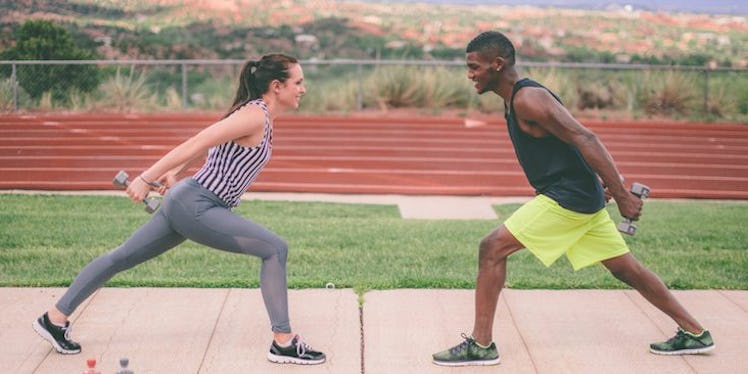
This Is Why Personal Trainers Always Tell You To Add An Extra Rep, Even When You Can't
If you've ever been in a one-on-one personal training session, you've likely been told something along the lines of, "Just one more rep! You're already in pain, work for it!" while you were already sweating your ass off. Even though you felt like you were working for it, you continued to hear these same "motivators" over and over again. And I'm sure you started to wonder whether your personal trainer was pushing you a little too hard. I mean, seriously, the phrase "just one more rep" is the biggest lie anyone has ever heard.
(High-intensity fitness instructors -- you are the reason why I have trust issues.)
But trust issues aside, powering through that last rep -- even when you literally feel like you're going to die -- actually has a name and a full-on philosophy behind it.
It's called training to failure. Also known as "concentric failure," training to failure is the concept of working your muscles to complete and utter exhaustion.
Think buckling knees, shaking biceps, and not really knowing if those sweat droplets are literal perspiration or your tears of defeat.
And in case I wasn't crystal clear, training to failure isn't just when you think you can't exercise any longer -- it's when you literally cannot do it.
More and more personal trainers are pushing their clients to the absolute limit, using terms like "AMRAP," which stands for "as many reps as possible" (I'm honestly sweating just writing about it).
Elite Daily spoke with personal trainer Holly Rilinger to get an insider's perspective on this whole idea of giving your sweat sesh 150 percent -- and then some.
She says "training to failure" may mean different things to different trainers:
For me, leaving a class or workout completely exhausted and tank on empty is what it's all about. It's the one hour that I set aside for myself every single day, so I'm going to give it my all.
Rilinger says, as a former professional basketball player, she believes a little edge is what makes you better than your opponent.
Using those same principals off the court has helped her get in the best shape of her life and train her clients at a higher level.
She tells Elite Daily,
It's the small victories that add up to big change. It's that last rep, that last sprint, that last part of yourself you give when you think there's nothing left that foster change.
That being said, it's still extremely important to tune into your body and the signals it's sending you when you engage in rigorous exercise.
Research from Eastern Illinois University showed, while the strategy can be effective, training to failure should not be performed repeatedly over long periods of time. Going all out all the time could lead to potentially debilitating injuries.
It's crucial to find that balance between recovery and reps, and really asses your individual goals to make sure you're not training to failure when your body is already exhausted AF.
You know yourself better than anyone else, and only you know the difference between, "Ugh, I just can't even," and, "Wow, I actually shouldn't."
Bottom line: Training to failure sounds absolutely savage, because it is.
However, it promises to push your body all the way to its absolute and incredible limit, so you can get the most optimal results in the most efficient amount of time.
So, if you're the type of person who could maybe use a little extra kick in the you-know-where, this strategy may be just what you need.
After all, as Rilinger says,
If we constantly stop when we feel like we are finished, then we will never change.